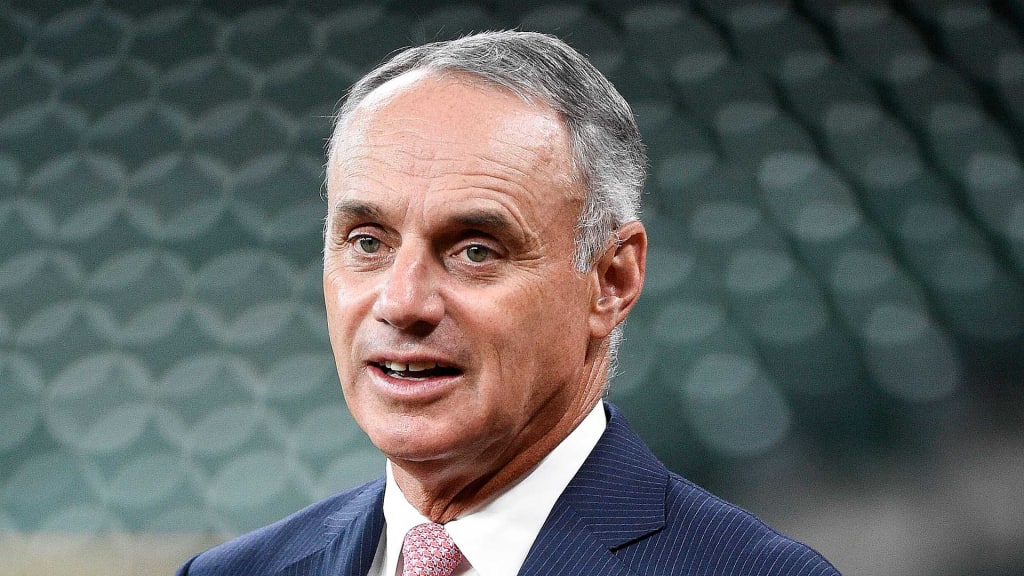
MINNEAPOLIS -- Major League Baseball Commissioner Rob Manfred helped the Minnesota Twins host a special event on Wednesday night as part of their annual Diversity Week at Target Field.
Manfred addressed the front office about diversity initiatives in the afternoon and then was a special guest for a diversity panel on Wednesday, being joined by Twins front office members and Susan Bass Roberts, the vice president of the Pohlad Family Foundation. The Grammy Award-winning group Sounds of Blackness also performed.
"The Twins have been one of our best performers in terms of their commitment to diversity," Manfred said. "It's an amazingly well-run organization. It's shown a real commitment to diversity over time and I can't say enough good stuff about the Twins on that front. I think tonight's event is a great example of how hard they've worked in this area."
Fresh off the Twin Cities hosting the annual RBI Baseball World Series from Aug. 6-16 and Major League Baseball holding the Little League Classic between the Mets and Phillies in Williamsport, Pa., on Sunday, Manfred said MLB is trying to reach the young, especially in underserved areas. He said it relates to diversity, as MLB is taking a ground-up approach to making the game more diverse.
"[The Little League Classic] was a real highlight for the sport and for me, personally," Manfred said. "I thought it was a great showcase for our games and our youth programs and most importantly, a great showcase for our players. Fans got to see them in a setting they don't often get to see them. Youth participation is a huge indicator for the future of our sport and we don't say that enough. The most played sport by children under the age of 12 in the United States is baseball. And a lot of that is Little League Baseball."
The Reviving Baseball in Inner Cities (RBI) program has also been a major success since its creation in 1989, while MLB has also helped build Urban Youth Academies across the country in Compton, Calif., Houston, New Orleans, Philadelphia and Kansas City with more on the way in the Bronx, Chicago and San Francisco. Manfred pointed out that over the last five years, 20 percent of first-round Draft picks are African-American, which is higher than the league percentage of eight percent.
"I think the most important thing is baseball has made a tremendous investment to make playing baseball available in underserved areas," Manfred said. "It's started with the RBI program and it's continued with the MLB Academies and it goes on through programs like our Elite Development Program in Vero Beach, [Fla.]. Those programs have started to bear fruit. And secondly, I sat with Stephen Keener of Little League Baseball and he pointed how much more diversity there is in the Little League World Series than a decade ago. Those are really good indicators for baseball."
Manfred also pointed out that while much attention has been paid to the decrease in African-American players, the game is more diverse than ever, especially with the influx of foreign talent from places such as the Dominican Republic, Cuba, Venezuela, Mexico, Japan and Korea. This year, a total of 254 players represented an all-time record 21 different countries on Opening Day rosters, making up 29 percent of the league.
MLB is also trying to reach those markets with international games, as the A's and Mariners will open the 2019 regular season with the Japan Opening Series in Tokyo from March 20-21. Additionally, the Yankees and Red Sox will play the first MLB games ever in Europe, in London from June 29-30, and there will be three series held in Monterrey, Mexico, including two in the regular season. The Rockies and the D-backs will play a pair of Spring Training games on March 9-10, while the Reds will host the Cardinals from April 13-14 and the Angels and Astros will play from May 4-5.
But Manfred said there's still work to do in terms of adding more diversity throughout the game, whether it's players, front office members or coaches. He stressed MLB has especially been working hard to increase diversity among non-players.
"We're interested in diversity in all aspects of our operation," Manfred said. "It begins with the game on the field, but it continues with those who are on the field in managerial positions and then on up to front-office positions and into the Commissioner's Cffice. We have programs in place to promote diversity in each and every one of our aspects of our business. They are long-term programs designed to bring a diverse group of people to work in the game, who can learn the ropes and progress to top-tier management positions. And same with the players. It begins at the bottom with our youth programs."